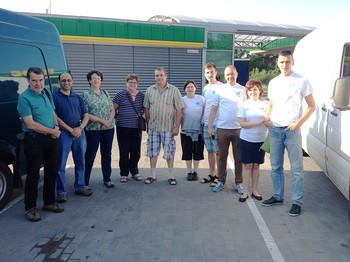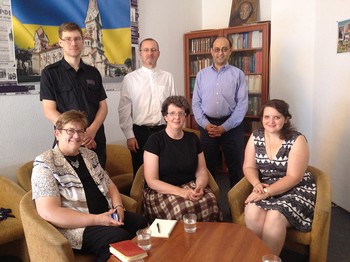Four members of the Presbyterian Church (U.S.A.) traveled to Ukraine and Russian this summer to listen to church leaders and those affected by the ongoing crisis in Ukraine, and learn about the churches’ role in bringing peace and healing to the two Slavic nations.
The group included Presbyterian World Mission staff Amgad Beblawi, mission co-workers Ellen Smith and Burkhard Paetzold, and this writer. Over the course of two weeks, the group traveled from Kiev and Odessa in Ukraine, to Moscow and St. Petersburg in Russia, meeting with church leaders and church-affiliated organizations in each city.
During the meetings, the group heard varied explanations of the crisis in Ukraine, varying from “Russian aggression,” to “civil war with Russian support,” and as a “proxy war between the U.S. and Russia.”
The historic connections between these two Slavic countries are significant. The Russian Orthodox Church traces its beginning to Kiev. The close bonds between the two populations are evident by widespread intermarriage and family ties across borders. The pain and suffering in the current conflict has torn apart families and prevented them from speaking with one another.
One young man the group met with is a member of the Community of Sant’ Egidio in Ukraine. He spoke eloquently and earnestly about the causes of the current fighting in East Ukraine and the increased tension between Ukraine and Russia. He emphasized the importance of continued conversations and fellowship among Christians within each nation regardless of their political convictions.
The group felt raw emotion and the broadest contrast in opinion in Kiev. The civic protest of hundreds of thousands of people and the shock of the resulting violence in 2014 in Maidan Square was a powerful experience for many. Some church leaders were in the square from beginning to end. The group visited a Lutheran church near Maidan, which provided medical services and sanctuary for the wounded. It was clear the energy of that experience is still with them.
From Kiev, the group traveled closer to the war zone, visiting an aid organization formed by five Baptist churches and Mennonites in the community. Their activities began as a message on Facebook, growing into a full-scale center, with a food pantry, legal and medical volunteers, and a supply chain of food, medicine, and clothing to aid refugees from the war torn area. While Ukrainian patriotism sometimes appeared in the conversation, their focus was on trying to help the victims of the conflict.
In Odessa, a city mostly outside the conflict, ethnic Russians and ethnic Ukrainians maintained good relations until violence prior to a soccer match in April 2014. Men wearing Russian armbands attacked a group of pro-Ukrainian soccer fans, leading to fighting in the street and a fire in an apartment building that caused the deaths of innocent people. It is not known whether the instigators were really Russian, but the event has divided people. Churches and neighborhoods formerly living in harmony are now divided along pro-Ukrainian and pro-Russian lines.

Paetzold, Beblawi, Smith and Morey of the PC(USA) with the local volunteer team in Zaporizhia, Ukraine, before driving toward the war zone to deliver food supplies to a shell-damaged town. —Photo provided
From Ukraine, the group spent a week in discussion with church partners in Moscow and St. Petersburg. There, politics have led to divisions between churches and families as well. One pastor spoke of the difficulty he is experiencing with his congregation being divided by allegiances to Western and Eastern Ukraine, each side calling for some sort of political statement by church leaders.
Most Russians were concerned about the role the U.S. and Western Europe have played in the conflict. Many believe that although sanctions were justified, the effect was completely opposite what was intended. The PC(USA) delegates agreed they were treated with nothing but hospitality and kindness but repeatedly heard that public opinion has turned against Americans like never before.
Ivan (not his real name), a professor of history at a Baptist seminary, said, “We see Ukraine being under U.S. influence. The Russian people are accustomed to suffering for their country and are willing to do it again. Most Russians were happy when Putin came to power, and now his popularity has increased significantly. The vast majority of Russians approve of his resistance to Western bullying.”
The churches’ response to the conflict in both Ukraine and Russia is deeply impacted by the history of the region’s history. During Soviet times churches in the USSR were united. There was one Orthodox Church, the Moscow Patriarchy, and one Protestant Union that included both Baptist and Pentecostal congregations. There were underground, unregistered churches that refused this kind of unity, both among the Protestants and the Orthodox. All believers suffered persecution under Soviet rule, many dying for their faith.
For Protestants, the collapse of the Soviet Union and the redrawing of national boundaries provided the opportunity to form new and separate unions and redefine denominational identity. Close ties were maintained with Ukrainian churches sending missionaries to Russia to help their Christian brothers and sisters grow the church. The Protestant churches in Ukraine were thriving in the new freedom, while the Russian Protestant churches continued to struggle under discrimination. The Orthodox Church has been divided on whether to be under Moscow Patriarchy or its own autocephalous church.
“Many Ukrainian Christians are angry with Russian Christians, because they will not use their voice, but many Russian Christians do not feel that they have a voice,” said Ellen Smith, a mission co-worker who has served Russia for more than 17 years. “In the current climate in Russia, even those who might have spoken out in the past feel such sadness; they don’t have the strength to use their voice.”

